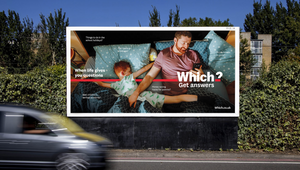
A Post-Apocalyptic View From the West Coast Vol.3

'Consumer'. I’ve always loathed this word. It’s an impersonal and slightly nebulous term that’s meant to help people in marketing departments identify and define their audience. But consuming, or consumption, has amassed some hefty negative associations in recent years. When I think of someone, or something, that consumes, my mental image is of one of those horrific factory fishing ships that reverse-terraforms the ocean by remorselessly hoovering-up anything living within its wake.
Then there’s 'consumption”. The consumption of something has become associated with our excesses. Like alcohol. Or fossil fuels. Consumption implies that having much more wouldn’t be good for a liver, a life, or the planet.

Consumerism has for a century fuelled economic growth, democratised everyday luxuries like technology, clothes, food and transport, not to mention been the lifeblood of the advertising industry. Consumerism began to rise in America during the 1920s, after the Great War, (and curiously enough, after the last global pandemic). Jobs were plentiful, wages were higher, and people were eager to spend after years of rationing and a lack of available consumer goods. So inextricably linked to culture in America is consumerism, that it accounts for a whopping 68% of its GDP, compared to 56% in the European Union, and 43% in China.
The US has a crack-like dependency on consumerism to drive its mighty economy forward. When Americans spend more, it leads to increased production, which leads to more employment, which leads to… more consumption. A simple virtuous circle which helps any outsider understand why Trump is feverishly determined to 'reopen the economy', despite a swathe of red flags. But if the global impact of consumerism had been exposed in the last few decades, thanks in part to the voice given to a generation about climate change by Greta Thunberg, then nature by way of Covid-19 has demanded greater, and global, regulation of our consumption.
Yes, consumerism is undoubtedly good for fuelling economic growth and innovation, but it also contributes to environmental degradation, extreme debt levels as well as physical and mental health problems. We have become obsessed with acquisition, and our insatiable urge to consume has dominated our lives; The must-have fashions, the latest gadgets, ordering more-than-is-necessary takeaways.
But the truth is, our needs are very limited, and there is no evidence to support the concept that the more stuff we acquire, the greater our happiness. In fact, since World War II American income per capita has trebled, yet levels of life satisfaction have remained about the same. So, if the pandemic has brought some small mercies, then self-reflection and imposed restrictions are two of them. And with the self-reflection, more of a conscience about what the real costs are behind the things we inhale during our visits to malls, grocery stores and while buying stuff we don’t really need online because we’re bored.
If 'conscience' isn’t applicable to everyone, then 'questioning' might be. Should you not be inclined to give so much as a flying fuck what sweatshop your summer wardrobe came from, or whether child-labour was involved, you most probably will be questioning if you will get much wear from it, given Magaluf is off bounds for a while. Assuming the saying is true that we wear 20% of our clothes 80% of the time, then in recent months we’ve probably worn no more than 5% of our clothes 95% of the time. And if we discover that our working lives, certainly for the next six to 12 months, will be from behind our laptops at home, then there’s simply no need to spend our precariously balanced income on things like 'work clothes'. As such, Jos A Bank, the US tailor, is looking like the latest retailer to be filing for bankruptcy…
Regardless of whether Covid-19 flattens or spikes, there is likely to be a societal shift in our purchasing behaviours as we cut back on conspicuous consumption, be that due to conscience, availability or financial reprioritisation. The end of consumerism as we know it would mean an unprecedented change in American culture, and the American economy. But this doesn’t mean the end of capitalism. Far from it.
It might feel all too utopian, but I suspect we will embark on an era of 'fewer/better'. More reciprocity, recycling and upcycling from less consumer goods with products priced to reflect a fairer distribution of their profits around the world. We will cut-back on the frivolous purchases that choke our closets, cupboards, shelves and storage – and by extension, produce far less wastage and landfill.
For marketers, this means fewer/better from products and packaging to advertising and communications. It will demand a shift from carpet-bombing the glutinous, nebulous consumer in multiple media in the vague hope they’ll engage, to using appropriate data and choice media to directly and succinctly speak to a more specific audience. As shoppers, we might become much more reliant on tech to assist us in 'merchandising our lives', so we only order what we need with minimal wastage.
And for agencies, it means fewer/better of us, too. As post-consumerism rapidly takes hold, the creative landscape will evolve – with speedily deployed campaigns designed around effectiveness that are light on wastage. Post-consumerism will not allow us to think of consumer demographics in quite the same way. That loathsome box titled 'the consumer' on a creative brief? It’ll be replaced with 'Steve', 'Sue', 'Nimesh'
or 'Nina'. And the work we creatives do will enrich people’s lives, rather than pollute them.
- Beri Cheetham, chairman and chief creative officer of The Gate San Francisco















